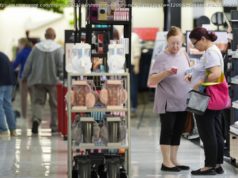China weaponizing its massive holdings of U. S. Treasuries by dumping them on the market would inflict serious damage to the Chinese economy.
Hiram Johnson, a U. S. senator speaking in 1916 against America’s entry into World War I, supposedly said, «The first casualty when war comes is truth.» Among its early casualties, the unfolding trade war has claimed objectivity.
Trade-war hysteria has fueled warnings that China could weaponize its massive holdings of U. S. Treasuries by dumping them on the market. This «nuclear option,» the Cassandras cry, would cause a severe spike in U. S. interest rates, tank America’s stock market and freeze its credit market, pushing the U. S. into recession and impeding the re-election of you know who.
Let’s take a step back from trade-war sensationalism and make an objective appraisal of the so-called nuclear option. In my view, such an action would inflict serious damage to the Chinese economy in short order – while leaving the U. S. relatively unscathed, at least in the near term. Over the longer term, China would suffer the discredit of the yuan, dooming its quest to achieve foreign-exchange reserve status for its currency and scaring away the needed foreign investment.
The reasons why the nuclear option would backfire stem from what let’s call «the mechanics of the basket.»
Global trade and financial settlements are conducted through the currencies of the world. The vast majority of international settlements – including commodity contracts and external debt of sovereign and corporate issuers – are denominated in U. S. dollars, the world’s reserve currency. Central banks must maintain stockpiles, or reserves, of dollars to defend their currencies against excessive weakness.
China runs a managed floating exchange rate of its yuan vis-à-vis a basket of foreign currencies. The U. S. dollar forms a large component of the basket. In order to keep the yuan in line with the basket, Chinese authorities must have dollars. According to the U. S. Treasury, China held $1.1 trillion in Treasuries as of March 31, the majority of which were held as reserves to collateralize trade and to capitalize China’s highly leveraged banking system.
For the sake of argument, let’s assume that Beijing exercises the nuclear option: China abruptly sells all its Treasuries and converts the proceeds into another asset such as gold or government bonds from another country.






